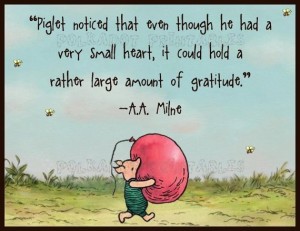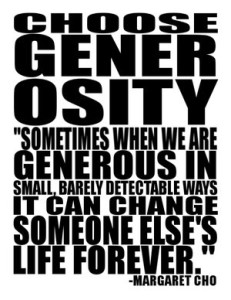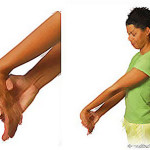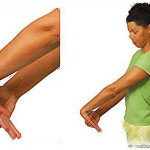I just wanted to send you a quick email to let you know the floor looks fantastic!
Gratitude: Five Ways to Pay it Forward
 Express gratitude for all that you have by paying it forward to help your community.
Express gratitude for all that you have by paying it forward to help your community.
- Volunteer. This is one of the best ways to help others and make a positive impact in your community. Find a local charity and volunteer a few hours a month or help someone you know.
- Mentor someone. Mentors provide useful insight and help guide people along their life path. Fancy titles and corner offices are not required; you only need to be comfortalbe with sharing your experiences, giving advice, or being an attentive listener.
- Share a skill. Teach others how to do what you do well. Many local colleges offer non-credit classes led by experts in the community. Many cities and towns offer classes through their community services division. If you don’t have time for one of these options, try on-line. Websites such as Skillshare give experts a platform to share knoweldge and skills with students from all over the globe.
- Use your skills to help others. Knit hats for newborns, make dinner for a lonley neighbor, help an elderly neighbor with repairs. Whatever it is, let your skills help improve someone’s day and quality of life.
- Write a kind note to someone. It doesn’t matter who you write the note to; only that its sentiments are genuine. Notes of encouragement, gratitude, or caring will boost the spirit of the person receiving the note and will encourage them to strive higher and maybe write a note of their own.
The Benefits of Generosity
Generous people tend to be happier and healthier than less generous peers.
Here are five benefits of generosity.
- A generous act can make someone’s day, improve their mood, and maybe even prompt them to pay the kindness forward.
- Generosity will contribute to the greater good of your community. It will help build relationships and a person will feel more connected to one’s neighborhood and community.
- A kind gesture will make you feel grateful that you are able to help which can make you more satisified with your own life.
- Being generous releases feel-good chemicals in our brain whch can help reduce stress.
- Improved work performance. Altruism can help boost work satisfaction and improve relationships with co-workers.
How Generous are Americans?
The top five states with the highest percentage of people who reported giving time and money to charity:
- Utah
- Minnesota
- Hawaii

- South Dakota
- New Hampshire
Source: Gallup Poll, May 2014
Hand-washing: Do’s and don’ts
Hand-washing is an easy way to prevent infection. Understand when to wash your hands, how to properly use hand sanitizer and how to get your children into the habit. By Mayo Clinic Staff
Frequent hand-washing is one of the best ways to avoid getting sick and spreading illness. Hand-washing requires only soap and water or an alcohol-based hand sanitizer — a cleanser that doesn’t require water. Find out when and how to wash your hands properly.
When to wash your hands.
Always wash your hands before:
- Preparing food or eating
- Treating wounds, giving medicine, or caring for a sick or injured person
- Inserting or removing contact lenses
Always wash your hands after:
- Preparing food, especially raw meat or poultry
- Using the toilet or changing a diaper
- Touching an animal or animal toys, leashes, or waste
- Blowing your nose, coughing or sneezing into your hands
- Treating wounds or caring for a sick or injured person
- Handling garbage, household or garden chemicals, or anything that could be contaminated — such as a cleaning cloth or soiled shoes
In addition, wash your hands whenever they look dirty.
How to wash your hands
It’s generally best to wash your hands with soap and water. Follow these simple steps:
- Wet your hands with running water.
- Apply liquid, bar or powder soap.
- Lather well.
- Rub your hands vigorously for at least 20 seconds. Remember to scrub all surfaces, including the backs of your hands, wrists, between your fingers and under your fingernails.
- Rinse well.
- Dry your hands with a clean or disposable towel or air dryer.
- If possible, use your towel to turn off the faucet.
Keep in mind that antibacterial soap is no more effective at killing germs than is regular soap. Using antibacterial soap may even lead to the development of bacteria that are resistant to the product’s antimicrobial agents — making it harder to kill these germs in the future.
http://www.mayoclinic.org/healthy-living/adult-health/in-depth/hand-washing/art-20046253
Avoiding Carpal Tunnel
Avoiding Carpal Tunnel
Stretches for Wrists and Forearms
Certain repetitive movements can lead to fatigue, discomfort, or pain. Taking a few minutes throughout the day to stretch wrists and fore arms will help avoid these problems.
http://www.dir.ca.gov/dosh/dosh_publications/janitors.pdf page 17
http://www.wikihow.com/Stretch
http://www.innerbody.com/image/musfov.html


